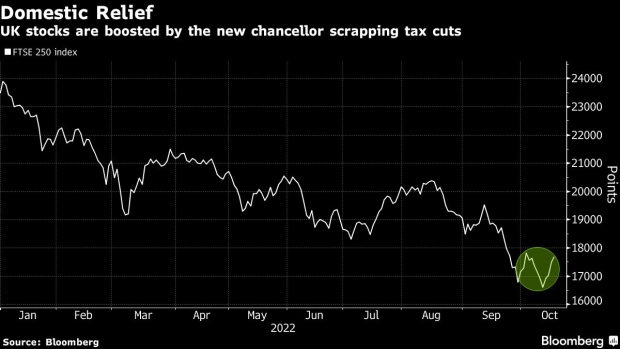Oct 18, 2022
Buy UK Domestic Stocks After Tax Cut U-Turn, Jefferies Says
, Bloomberg News

(Bloomberg) -- Domestic UK shares offer a buying opportunity after the reversal of Prime Minister Liz Truss’s unfunded tax cuts, according to Jefferies.
“A tradeable rally in the FTSE 250 is appearing,” strategists including Sean Darby wrote in a note to clients Tuesday, suggesting they go long the benchmark -- whose firms earn about half their sales in Britain -- versus the exporter-heavy FTSE 100 index.
The mid-cap gauge was 0.3% higher as of 10:30 a.m. in London, paring earlier gains after the Bank of England denied a Financial Times report which said its gilt-sale program would be delayed. It rallied on Monday after new Chancellor of the Exchequer Jeremy Hunt confirmed that most of the tax cuts announced by predecessor Kwasi Kwarteng would be ditched in order to restore calm in the markets, prompting a drop for gilt yields.
“The UK government has essentially shifted policy initiatives back to the Bank of England and removed the perception that the two were at odds with each other,” added Darby. A subsequent narrowing of credit spreads and financial conditions “euphemistically easing” should benefit the FTSE 250 over the FTSE 100, he said.
The gauge -- which includes stocks most sensitive to the UK’s domestic economy, like homebuilder Bellway Plc and retailer Marks & Spencer Group Plc -- is still lower than it was before Kwarteng’s “mini-budget” just over three weeks ago. It’s fallen 25% this year amid escalating cost-of-living and energy crises and pound weakness.
Not all analysts are upbeat following Hunt’s announcement on Monday. Shore Capital’s Clive Black said the government’s “watered down” energy support measures leaves a “grim” outlook for UK consumer stocks. A program to freeze energy prices at £2,500 for the average household will be scrapped at the end of this winter.
Meanwhile, Goldman Sachs Inc. strategists warned on Friday that a scheduled increase in corporation tax -- which Truss and Kwarteng wanted to halt -- could reduce FTSE 250 post-tax profits by 4% and those of FTSE 100 firms by 2%. Strategists including Sharon Bell said they continue to favor the blue-chip index.
©2022 Bloomberg L.P.





